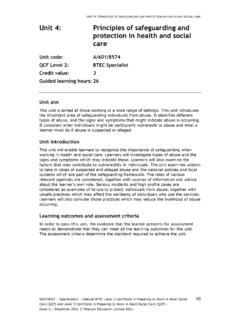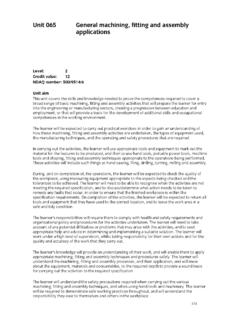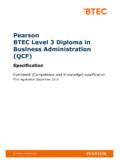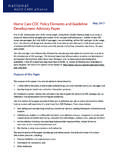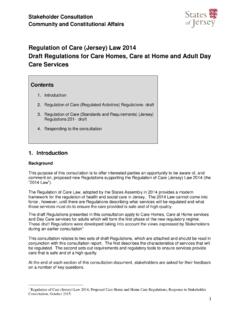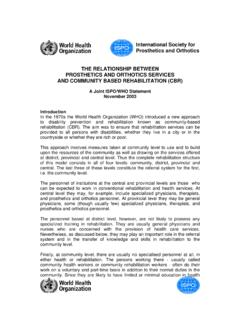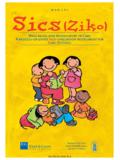Transcription of Unit 52: Work with Children and Young People in a ...
1 Unit 52: Work with Children and Young People in a Residential Care Setting Unit code: CYPOP 35. Unit reference number: A/600/9809. QCF level: 3. Credit value: 5. Guided learning hours: 35. Unit summary This unit provides generic knowledge and competence for practitioners working in residential care, regardless of the theoretical approach used. Many areas of competence for working with Children and Young People are common to all practitioners, but this unit explores the specific skills and understanding needed to share a living space with Children and Young People . Assessment requirements/evidence requirements This unit must be assessed in line with Skills for Care and Development's Assessment Strategy. Learning outcomes 3, 4 and 5 must be assessed in real work situations. Simulation is not permitted for these learning outcomes. Learners can enter the types of evidence they are presenting for assessment and the submission date against each assessment criterion.
2 Alternatively, centre documentation should be used to record this information. N029954 Specification Edexcel Level 3 Diploma for the Children and Young People 's 345. Workforce (QCF) Issue 3 December 2011 Pearson Education Limited 2011. Unit content 1 Understand the legal, policy, rights and theoretical framework for residential care for Children and Young People Current theoretical approaches to residential provision for Children and Young People : attachment theory; separation/loss theory; concept of corporate parent Legal and rights framework: relevant to own home nation eg Children Act 1989, Children Act 2004, Every Child Matters 2003, Care Matters 2006, Equality Act 2010. Influence of current policies and legislation on residential care provision: requirements of national minimum standards for Children 's care homes;. Human Rights Act 1998, Children Leaving Care Act 2000, Local Authority circulars (eg LAC (2004)), Office for National Statistics; emphasis on multi-agency working and integrated approach; child-centred or Young - centred approach to provision of services; emphasis on positive outcomes for child or Young person How the life chances and outcomes of Children and Young People in residential care compare with those who are not: eg Children in residential care or who have been in residential care more likely to feel socially excluded, more likely to experience difficulty in succeeding in education and finding long-term employment, more likely to have emotional and behavioural difficulties 2 Understand own role and professional responsibilities in a residential care setting Requirements of professional codes of conduct and how they apply to day- to- day work activities: professional bodies.
3 Care Councils eg General Social Care Council (GSCC), Care Council for Wales, Northern Ireland Social Care; Council code of practice; requirements of organisational policies of setting eg quality issues, complaints and appeal procedures, confidentiality, human rights, employee and employer rights and responsibilities, equal opportunities policies, whistle-blowing, anti- discriminatory practice, recording and storing of information, confidentiality How to ensure that own practice is inclusive and anti-discriminatory and how to challenge practice that is not: understanding and adapting own beliefs and attitudes; recognising stereotypes in attitudes or written materials; review and develop inclusive policy and procedures;. identifying and challenging discriminatory behaviour; know how to report concerns; whistle-blowing policy; confidentiality; protection from repercussions towards the individual who reported the incident or those whose practice is being questioned; avoiding discrimination or victimisation 346 N029954 Specification Edexcel Level 3 Diploma for the Children and Young People 's Workforce (QCF) Issue 3 December 2011 Pearson Education Limited 2011.
4 How power, prejudice and discrimination can affect Children and Young People : discrimination eg direct discrimination, indirect discrimination, institutional discrimination; prejudice and discrimination eg some individuals being treated less favourably than others, lack of opportunity, injustice, harassment, stereotyping, labelling; affect on Children and Young People eg delay in development, diminished opportunities and life chances, disadvantage, feeling of exclusion and rejection, lack of motivation and reluctance to participate, feelings of mistrust, anger, despair, confusion, negative impact on self-esteem and self-image, negative behaviour eg aggression, violence, self-harm How to fulfil own responsibilities to colleagues through responsible, constructive and cooperative teamworking: importance of teamwork;. inclusive practice; non-judgemental attitude; valuing professionalism and skills of colleagues; using agreed assessment methods; accurate report writing and care planning; develop good interpersonal skills eg assertiveness, effective communicator; relationships built on trust and mutual respect Professional requirement to maintain current, competent practice: Continuous Professional Development (CPD) requirements; understand and follow lines of reporting and accountability; requirements and procedures for record-keeping, sharing information, staff supervision and support; adhering to codes of conduct and ethics for own profession Importance of maintaining positive relationships with People in the local community: developing partnerships with the local community eg through projects, volunteering, mentors; active listening to the ideas of People in the local community.
5 Knowledge of groups represented in the local community eg beliefs, cultures, values, preferences; using appropriate and/or preferred methods of communication with People in the local community 3 Be able to work with Children and Young People through the day- to-day activities involved in sharing a living space Develop relationships with Children or Young People through jointly undertaking practical activities: sharing of residential tasks appropriate to Young person's age and in line with policies and legislation; taking account of child or Young person's culture, beliefs, ethnicity, age, abilities, interests and individual when involving them in practical activities; adopting inclusive approach to undertaking of practical activities; offer support and encourage development of independence and accountability in child or Young person; offer choice/flexibility and involve child or Young person in decision making as appropriate Ways to work with Children or Young People to plan, review and evaluate activities and agreements for group living: importance of Young People taking ownership of living space; recognise child or Young person's need for independence and sense of belonging and dignity; involve child or Young person in decision making; design achievable, realistic activities and arrangements; other ways eg identify resources and support necessary for success, agree a review process and timeframes for achievement, identify and celebrate progress and achievements, identify where agreed goals have not been met, agree reasons for non- N029954 Specification Edexcel Level 3 Diploma for the Children and Young People 's 347.
6 Workforce (QCF) Issue 3 December 2011 Pearson Education Limited 2011. achievement, involve child or Young person in agreeing any changes to activities and arrangements, provide clear reasons and instructions regarding any changes How to encourage Children or Young People to take responsibility for their own plans: support Children and Young People to take responsibility for their own plans as appropriate to their age and level of understanding; provide accurate information about consequences so that Children and Young People can make well-informed choices; provide support in a non-judgemental and respectful way; encourage development of self-esteem so that Children and Young People feel confident about making choices relating to their own lives How to link planning day-to-day activities in a residential setting links to the overall care plan for a child or Young person: need for Young People to share their views meaningfully and in a variety of ways.
7 Involve Children or Young People in decisions that affect their lives; help Children and Young People to understand the importance of attending care review meetings and other meetings; planning and recording how day-to-day activities meets individual development needs of the child or Young person eg development of social and communication skills, physical development, emotional development How to encourage positive behaviour through modelling and reinforcement in all aspects of group living: importance of worker being a good role model through own behaviour and using positive reinforcement; encourage Children and Young People to attend school, complete homework, participate in other activities 4 Be able to work with Children and Young People in a residential setting How to facilitate agreement of arrangements for living together regardless of group size: act as a positive role model, assist Children and Young People to show consideration to others; allow Young People to devise house rules' and to share their views on what should occur when the rules' are not adhered to.
8 Set clear boundaries How to address and resolve conflict and disagreements with and between Children or Young People in a residential setting: eg acting as a positive role model, importance of encouraging Children or Young People to resolve conflict for themselves if possible, empowering Children and Young People to make positive choices for themselves, support Children and Young People in learning how to deal with disagreements and develop conflict solving strategies, assist Children and Young People in developing coping strategies, stress management and anger management skills, enable Children and Young People to avoid violence, plan positive, attractive activities for Children and Young People to engage in to minimise risk of boredom Use an understanding of group dynamics to promote and encourage Children or Young People to achieve positive outcomes in all aspects of their lives: the stages of forming groups, eg Tuckman's theory; different types of group which a child or Young person might be part of; how People in a group gain or do not gain influence over others in the group 348 N029954 Specification Edexcel Level 3 Diploma for the Children and Young People 's Workforce (QCF) Issue 3 December 2011 Pearson Education Limited 2011.
9 Eg through social status, appearance, age, personality; effect of group dynamics and influence of others on child or Young person's behaviour, self- image, self-identity and self-esteem; supporting child or Young person's links with their families and local community 5 Be able to safeguard Children and Young People in a residential care setting How to equip Children or Young People to feel safe and to manage risks: support Children and Young People to assess risks; help Children and Young People develop skills to minimise risks; provide information about ways for Children and Young People to feel safe and protect themselves The practical application of legislation, policies and procedures and key messages form research and child protection enquiries for residential care setting: highlighting the importance of personal safety eg via talks from relevant local agencies, input from PCSO, Youth Offending Team worker; inter-agency practice, multi-agency working, integrated approach and information sharing; listening to views and concerns of Children and Young People ; working in an open, accountable and transparent way; following requirements for risk assessment.
10 Implications of Serious Case Reviews, legislation, policies on missing Children or Young People in care; reporting arrangements where abuse inside and/or outside the setting is suspected; requirements for reporting recording and sharing information; importance of following organisational policies for setting How to take action to protect Children and Young People in residential care from risks of harm or abuse from outside or inside the residential setting: follow required policies and procedures of the residential care setting eg health and safety, behaviour management plans and care plans, supervised/restricted contact between child or Young person and certain People outside of the setting; work in integrated way to share information with other agencies and professionals involved in the care of the child or Young person; help Children and Young People develop skills to protect themselves from risk of harm or abuse; understanding of individual circumstances, needs and abilities of child or Young person that could make them vulnerable to harm or abuse N029954 Specification Edexcel Level 3 Diploma for the Children and Young People 's 349.


